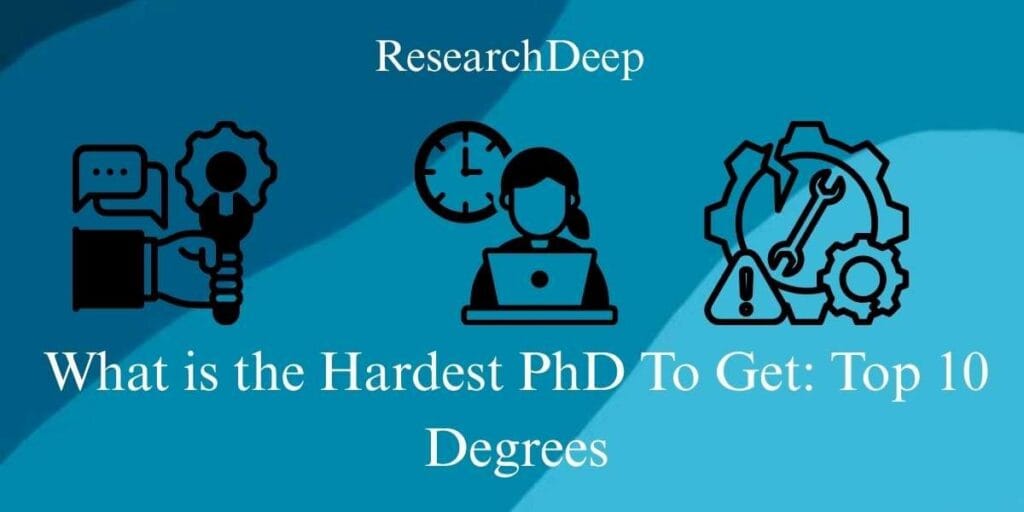Last updated on November 25th, 2025 at 01:23 pm
Without a globally recognized grading system, the difficulty of a program depends on its structure, time commitment, required skill set, and job market demand.
Pinpointing the most challenging PhD to obtain can be highly subjective, influenced by personal strengths, interests, opinion polls, and prior knowledge of the field.
This article aims to provide credible insights into the 10 most commonly rated hardest PhDs, evaluated based on their intensity, rigor, and the fact that they are among the most lucrative growth-wise, in-demand, and comparatively offer higher salaries.
Table of Contents
At the outset, it is essential to clarify that while all PhDs are doctorates, not all doctorates are PhDs.
Some of the Doctor of Philosophy programs highlighted on this list are also doctoral programs, and understanding the difference between a PhD and a doctorate is necessary, as there can be overlap between the hardest PhDs and the hardest doctorate degrees.
Commonly Rated Hardest PhD To Get
1. MD/PhD
- Program Overview: The MD/PhD program integrates medical training with research, preparing students for careers as physician-scientists.
- Challenges: Balancing clinical responsibilities with research demands over an extended training period
- Career Prospects: Opportunities in academic medicine, biomedical research, and healthcare leadership.
- Notable Institutions: Harvard Medical School, Johns Hopkins University.
The extensive time commitment, demanding coursework, and the need to balance clinical duties with research responsibilities make it one of the most difficult doctorates to obtain.
2. PhD In Mathematics
- Program Overview: Focuses on advanced theoretical or applied mathematical concepts, fostering innovation in technology, finance, and academia.
- Challenges: Abstract and complex nature of research topics. That requires heavy reliance on self-discipline for theoretical breakthroughs and limited immediate applications of pure math research.
- Career Prospects: Academic teaching, data science, quantitative analysis in finance, and AI research.
- Notable institutions include Princeton University, the University of Cambridge, and ETH Zurich.
3. PhD In Physics
- Program Overview: Focuses on investigating the principles governing the universe, from quantum mechanics to astrophysics.
- Challenges Include Long experimental timelines, unpredictable outcomes, and the need to secure funding for large-scale research projects.
- Career Prospects: Academia, research laboratories, aerospace, and renewable energy sectors.
- Notable Institutions: California Institute of Technology (Caltech), CERN-affiliated universities, University of Tokyo.
4. PhD In Computer Science
- Program Overview: This involves a deep exploration of algorithms, artificial intelligence, machine learning, cybersecurity, and data systems.
- Challenges: Maintaining intense focus on technical details and programming expertise to keep pace with an ever-changing landscape of tools and languages, while also publishing innovative research in highly competitive areas.
- Career Prospects: Academic roles, software engineering, AI research, data science, and leadership positions in tech companies.
- Notable institutions include Carnegie Mellon University, MIT, and the University of Cambridge.
5. PhD In Electrical Engineering
- Program Overview: Focuses on advancing electrical systems, signal processing, robotics, and telecommunications technologies.
- Challenges: Keeping up with rapidly evolving technologies to manage high computational and experimental demands and securing industry collaborations for applied research.
- Career Prospects: Academic roles, robotics, renewable energy, semiconductor industries, and telecommunications.
Notable institutions include Stanford University, the University of California, Berkeley, and ETH Zurich.
6. PhD In Chemistry
- Program Overview: This program focuses on advanced chemical research across the domains of organic, inorganic, analytical, and physical chemistry.
- Challenges: Long experimental cycles require meticulous precision with a high dependency on funding for sophisticated lab equipment and managing safety and ethical considerations in chemical research.
- Career Prospects: Academia, pharmaceutical research, material science, and environmental consultancy.
- Notable Institutions: University of California, Berkeley, ETH Zurich, University of Oxford.
7. PhD In Law (JSD/SJD)
- Program Overview: The JSD or SJD is the terminal degree in law, emphasizing legal research and scholarship.
- Challenges: Rigorous analysis of legal precedents to produce a substantial and original dissertation despite the limited availability of supervision for niche topics.
- Career Prospects: Law professors, policy advisors, international legal consultants.
Notable Institutions: Yale Law School, University of Oxford, Harvard Law School.
8. PhD In Neuroscience
- Program Overview: This program explores the complexities of the brain and nervous system, from molecular mechanisms to cognitive behaviors.
- Challenges: Navigating interdisciplinary knowledge in biology, psychology, and medicine, and handling ethical considerations in animal and human research with extensive use of cutting-edge imaging and analytical technologies.
- Career Prospects: Academic roles, neuropsychology, pharmaceutical R&D, cognitive science, and biotech innovation.
- Notable Institutions: Johns Hopkins University, Harvard University, University College London (UCL).
9. PhD In Philosophy
- Program Overview: This program explores profound questions about knowledge, existence, ethics, and logic.
- Challenges: Writing long, complex dissertations on abstract concepts with limited funding opportunities, besides solving a relatively niche academic job market.
- Career Prospects: Academic positions, publishing, public policy, and ethical advisory roles.
- Notable Institutions: University of Pittsburgh, Harvard University, University of Oxford.
10. PhD In Economics
- Program Overview: Develop advanced skills in economic theory, econometrics, and data analysis to address complex global challenges.
- Challenges: Managing dense mathematical and statistical methodologies to create models that balance theory with real-world applications.
- Career Prospects: Academic roles, financial institutions, policy-making organizations, and international NGOs.
- Notable Institutions: London School of Economics (LSE), University of Chicago, MIT.
Note: Since rankings depend on supply and demand, it is helpful to visit sources like U.S. News & World Report, which publishes annual rankings of PhDs in the United States, to assess the latest difficulty levels.
Why are these the hardest PhDs to get?
The difficulty of certain PhD programs stems from a combination of rigorous admission standards, exhaustive programs, technical complexity, and high expectations for research and publication.
Below is a detailed explanation of the factors contributing to the difficulty of these programs:
| Factor | Description |
|---|---|
| Admission Standards | Selective Admission Procedures: Top-tier schools employ highly selective admissions, accepting only a limited number of applicants. Academic Scrutiny: Applicants undergo rigorous scrutiny of their academic backgrounds. |
| Exhaustive Programs | Formal Evaluation: The thesis must be formally submitted and defended before a committee of experts. Approval Process: The committee decides on approval or modifications, adding stress to the process. |
| Lengthy Duration & Technicality | Extended Time Commitment: Many hard PhDs take a significant amount of time to complete. High Technical Complexity: These programs require advanced problem-solving skills and critical thinking capabilities. |
| Thesis Approval | Building Networks: Establishing a collaborative network with supervisors, colleagues, and mentors is crucial, especially for those pursuing a PhD. |
| Research Process | Time & Determination: Research requires a substantial investment of time and unwavering determination. Handling Uncertainties: Navigating uncertainties and failures is a key part of the research journey. |
| Journal Publications | Publish or Perish Culture: Many PhDs require publishing research outcomes in peer-reviewed journals for recognition and advancement. |
| Collaboration & Networking | Building Networks: Establishing a collaborative network with supervisors, colleagues, and mentors is critical, especially for hard PhDs. |
| Time Management | Efficient Scheduling: Managing time efficiently to accommodate editorial processes is crucial, given the exhaustive nature of these programs. |
| Interdisciplinary Methodologies | Multidisciplinary Approaches: Programs like computer science or neurology incorporate interdisciplinary methodologies, adding to the scheduling complexity and overall difficulty. |
Related Reads:
What Is The Toughest Part Of A PhD?
FAQs
Which PhD pays the Highest salary?
Several factors contribute to the highest PhD salary. However, with a projected 23% rise from 2022 to 2032, information science is the fastest-growing field for individuals with PhD degrees, according to the BLS.
What PhDs are in the Most In-demand?
Industry trends significantly influence the most in-demand PhD as businesses and governments alike seek expertise in emerging fields. Interestingly, the top five most sought-after PhD programs of 2023 were all in STEM fields.
What are the Easiest PhDs to Get?
“Easiest PhDs” is a relative term that depends on factors such as prior expertise, interest, and available resources; what seems manageable for one person might be challenging for another.
Conclusion
Earning a PhD is a remarkable achievement, requiring years of dedication, intellectual rigor, and resilience. Among the various doctoral programs, some stand out for their exceptional difficulty due to the complexity of the subject matter, the demanding nature of research, and the unique challenges inherent to specific fields.
Choosing the right PhD program is a deeply personal decision influenced by your interests, career goals, and willingness to overcome the challenges each discipline presents. While pursuing one of the “hardest” PhDs might seem daunting, the potential rewards—whether in terms of career opportunities, intellectual fulfillment, or contributions to society—can make the journey worthwhile.
If you’re considering embarking on this path, remember that preparation and informed decision-making are key.
Related Read: Navigating A PhD: 16 Mistakes to Avoid
Remember, if you have a passion for research, no PhD is hard if you want it!





Comments are closed.